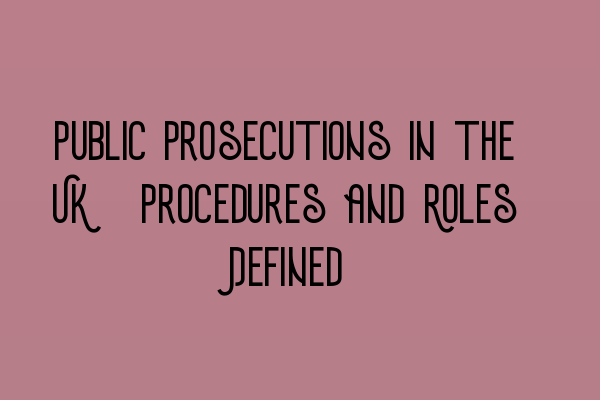Public Prosecutions in the UK: Procedures and Roles Defined
When it comes to criminal law in the UK, public prosecutions play a crucial role in upholding justice and maintaining law and order. Understanding the procedures and roles involved in public prosecutions is essential for anyone involved in the legal system or those seeking a comprehensive understanding of the British legal system. In this article, we will explore the procedures and roles defined in public prosecutions in the UK.
The Role of the Crown Prosecution Service (CPS)
The Crown Prosecution Service (CPS) is the principal prosecuting authority in England and Wales. It is responsible for reviewing cases brought by the police and other investigative agencies and determining whether there is enough evidence to proceed with a prosecution. The CPS works closely with the police to build strong cases against individuals accused of committing criminal offenses, playing a vital role in bringing offenders to justice.
To ensure a fair and unbiased process, the CPS operates independently of the police and other government agencies. This independence is crucial in maintaining the integrity of the prosecution process and upholding the rule of law.
The DPP’s Role in Public Prosecutions
The Director of Public Prosecutions (DPP) is the head of the CPS and is responsible for overseeing the prosecution process. The DPP plays a critical role in shaping policies, reviewing cases, and providing legal guidance to prosecutors. Their expertise and experience contribute to maintaining high standards within the prosecution system and ensuring fairness for both victims and defendants.
The DPP works closely with Chief Crown Prosecutors (CCPs) who oversee the prosecution process in specific areas of the country. CCPs are responsible for ensuring that cases are handled effectively and efficiently, and that they align with the CPS’s standards and guidelines.
The Prosecution Process
The prosecution process typically begins with the police conducting an investigation into a suspected criminal offense. If the police gather sufficient evidence to suggest a reasonable prospect of conviction, they will refer the case to the CPS for further consideration.
Upon receiving a case, the CPS will meticulously review the evidence to determine whether it meets the required legal threshold for prosecution. They will consider factors such as the sufficiency and reliability of evidence, public interest, and any potential defenses that the accused may raise.
If the CPS determines that there is enough evidence and it is in the public interest to proceed, they will initiate legal proceedings by bringing charges against the accused. The case will then progress through the court system, where the prosecution will present their evidence and arguments to prove the accused’s guilt beyond a reasonable doubt. The defense will have the opportunity to contest the evidence and present counterarguments on behalf of the accused.
The outcome of a trial ultimately rests with the judge or jury who will deliberate the evidence presented and deliver a verdict. If the accused is found guilty, the court will impose an appropriate sentence.
Conclusion
Public prosecutions in the UK are a vital aspect of the criminal justice system. The Crown Prosecution Service, with the Director of Public Prosecutions at its helm, plays a crucial role in determining which cases proceed to trial and ensuring that justice is served. Understanding the procedures and roles defined in public prosecutions is essential for anyone involved in the legal profession or seeking an in-depth knowledge of the British legal system.
For more information on legal representation in the UK, consider reading our article on Legal Representation for Delaware LLCs in the UK: Expert Advice. If you are interested in ethical business practices, our article on Ensuring Ethical Business Practices: Delaware’s Code of Conduct provides valuable insights. Additionally, if you are interested in the UK legal system, our article on UK Criminal Law: An In-Depth Analysis of the British Legal System offers a comprehensive analysis of the subject.
